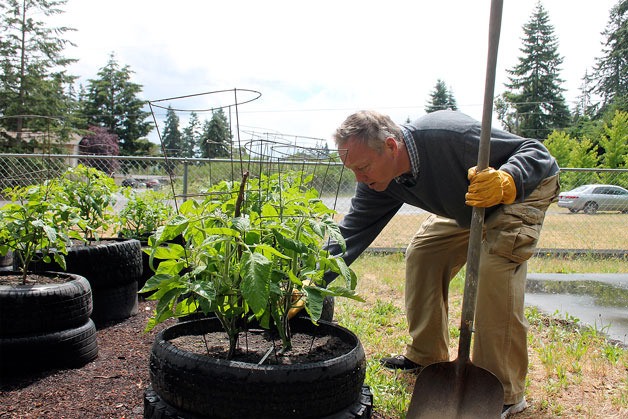Clinton has a new community gathering space, and it involves one of South Whidbey’s favorite hobbies: gardening.
Pastor Mikkel Hustad of St. Peter’s Lutheran Church had a vision to bring together the Clinton community by giving the downtown area the community garden it never had. Hustad and his church recently decided to convert a portion of the church’s land into a multi-purpose community garden. The 50-by-40-foot patch was designed not only as a way for St. Peter’s to grow food for Good Cheer Food Bank and those in need, but also for Clinton residents to grow their own produce for self-sufficiency. Initial planting began in May.
According to Hustad, the community garden is the first of its kind on the South End. Community gardens aren’t new to the area, but he says the garden at St. Peter’s brings something new to the table with the ability of dual usage.
“People on South Whidbey are interested in community service, and there is also a dedicated group of self-sufficient gardeners here,” Hustad said. “It seemed natural to us to combine the two to create an opportunity for service.”
Hustad has additionally been in touch with the Clinton Chamber of Commerce about potentially hosting community events in the future that would increase foot traffic in the downtown Clinton area. Chamber President Stephanie Cook said the possibility of events at the garden aligns with the chamber’s vision of more gathering spaces in Clinton.
One of the favorite proposed ideas put forward thus far is the establishment of regular picnics using the produce grown in the garden. Church officials are planning to hold seasonal harvest festivals in the future. Hustad said the plot of land, which includes a parking lot, is large enough to set up an eating area.
It’s an idea that Cook said can only benefit Clinton’s economy with the increased foot traffic.
“The more gathering spaces we have in Clinton, the more people will come to hang out,” Cook said. “Whether it’s gardening or going to the gym across the street, these things bring economic growth because they bring more foot traffic to the area.”
There is also plenty of room to expand the garden if space becomes tight, with a roughly 100×100 foot area also unused on the church grounds. Hustad said he has thought about planting fruit-bearing trees and another pea patch in the space.
St. Peter’s leaders also hope to educate the community about sustainable gardening methods. For example, Hustad and the church are currently experimenting with the use of leftover tires from Simmons Garage on Highway 525 in the garden, as they retain water well when repurposed as pots. It also inherently creates less trash.
“I have thought of some of the ecological issues that come with gardening, and we’d like to educate the community on those issues,” Hustad said. “We thought of ways to garden more efficiently, so we have looked into different ways to use mulch more effectively and how to increase water retention.”
Use of the garden by the public is free, and there are currently no rules about usage.
Hustad is encouraging the public to take advantage of the space, saying there is still a lot of room available for prospective gardeners. He’s not hesitant about the potential of starting a large gardening operation.
“We are not afraid of full scale gardening,” Hustad said. “We have the tools, willingness and expertise as we regularly talk with the garden club, which meets at St. Peter’s.”



